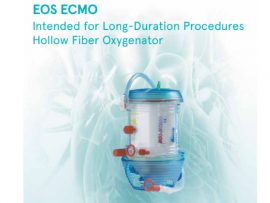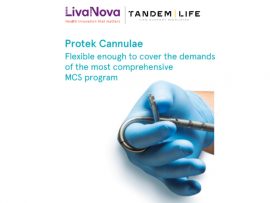Abstract Extracorporeal membrane oxygenation (ECMO) is a cardiac or pulmonary function support system that is used in cases of refractory organ failure in addition to conventional treatment. Currently, Level I..
Read MoreAbstract Background Although cardiogenic shock requiring extracorporeal life support (ECLS) after cardiac surgery is associated with high mortality, the impact of sex on outcomes of post-cardiotomy ECLS remains unclear with..
Read MoreAbstract Aims This study evaluated how well serial pulse pressure (PP) and PP adjusted by the vasoactive inotropic score (VIS) predicted venoarterial extracorporeal membrane oxygenation (VA-ECMO) weaning success and clinical..
Read MoreAbstract Aim Venoarterial extracorporeal membrane oxygenation (VA-ECMO) has become a common intervention for patients with cardiogenic shock (CS), often complicated by cardiac arrest (CA). Moderate hypothermia (MH) has shown promise..
Read MoreAbstract Refractory septic shock is associated with a high risk of death. Circulatory support in the form of veno-arterial extracorporeal membrane oxygenation (VA ECMO) may function as a bridge to..
Read MoreAbstract Despite immediate coronary revascularization, mortality of patients experiencing infarct-related cardiogenic shock (AMICS) remains high [1]. Over the past decade, there has been a growing interest in the use of..
Read MoreAbstract Mortality in infarct-related as well as heart failure-associated cardiogenic shock remains high, reaching 40–50% depending on the etiology and severity of cardiogenic shock. Percutaneous active mechanical circulatory support devices..
Read MoreAbstract Background: Cardiogenic shock in children still carries a high mortality risk despite advances in medical therapy. The use of temporary mechanical circulatory supports is an accepted strategy to bridge patients..
Read MoreAbstract Weaning and liberation from VA ECMO in cardiogenic shock patients comprises a complex process requiring a continuous trade off between multiple clinical parameters. In the absence of dedicated international..
Read MoreAbstract Over the past decade, veno-arterial extracorporeal membrane oxygenation (VA-ECMO) has expanded rapidly as a salvage strategy to provide temporary circulatory and respiratory support allowing cardiac function recovery or bridging..
Read MoreAbstract The objective was to investigate the outcomes of concomitant venoarterial extracorporeal membrane oxygenation (ECMO) and left ventricular unloading with Impella (ECPELLA) compared with ECMO alone to treat patients affected..
Read MoreAbstract Venoarterial extracorporeal membrane oxygenation (VA ECMO) has become a standard of care for severe cardiogenic shock, refractory cardiac arrest and related impending multiorgan failure. The widespread clinical use of..
Read MoreAbstract Introduction Veno-arterial extracorporeal membrane oxygenation (V-A ECMO) improves end-organ perfusion in cardiogenic shock but may increase afterload, which can limit cardiac recovery. Left ventricular (LV) unloading strategies may aid..
Read MoreAbstract The utilization of temporary mechanical circulatory support (tMCS) has increased significantly over the last 40 years for stabilization of salvageable patients; however, there has not been much improvement in..
Read MoreAbstract Background: The purpose of this investigation was to evaluate the impact of venoarterial extracorporeal membrane oxygenation (VA–ECMO) integrated hemoadsorption on the reversal of multiorgan and microcirculatory dysfunction, and early..
Read MoreAbstract Objective Although (ECLS) has increasingly been used for the of patients with (CS), the outcomes of those successfully weaned from support remain poorly defined. Methods Of 510 venoarterial ECLS CS patients at..
Read MoreAbstract Background Reliable predictors of outcomes in venoarterial extracorporeal membrane oxygenation (VA-ECMO) therapy are limited. While elevated lactate levels over time have been linked to outcomes in cardiogenic shock (CS),..
Read MoreAbstract Venoarterial extracorporeal membrane oxygenation (VA-ECMO) shunts venous blood to the systemic arterial circulation to provide end-organ perfusion while increasing afterload that may impede left ventricle (LV) ejection and impair..
Read MoreAbstract BACKGROUND The effects of temporary mechanical circulatory support with a microaxial flow pump on mortality among patients with ST-segment elevation myocardial infarction (STEMI) complicated by cardiogenic shock remains unclear...
Read MoreAbstract Purpose: Venoarterial extracorporeal membrane oxygenation (V-A ECMO) can be used to support severely ill patients with cardiogenic shock. While age is commonly used in patient selection, little is known..
Read MoreAbstract Veno-arterial extracorporeal membrane oxygenation (VA-ECMO) is a powerful hemodynamic support strategy for patients with cardiogenic shock and out-of-hospital cardiac arrest (OHCA). Given that significant proportions of patients presenting with..
Read MoreAbstract The use of extracorporeal membrane oxygenation (ECMO) to support patients with cardiac arrest, cardiogenic shock, and acute respiratory distress syndrome is rising worldwide.1 While ECMO may save the lives of..
Read MoreAbstract Veno-arterial extracorporeal membrane oxygenation (V-A ECMO) is increasingly used to treat refractory cardiogenic shock, despite randomized clinical trials reporting no difference in outcomes., Although traditional ECMO pumps maintain a constant flow..
Read MoreAbstract Cardiogenic shock (CS) is a critical clinical syndrome characterized by inadequate tissue perfusion and oxygen delivery resulting from severe heart dysfunction, leading to multi-organ failure. Diagnostic criteria include hypoperfusion..
Read MoreAbstract Background Monitoring fluid therapy is challenging in patients assisted with Veno-arterial ECMO. The aim of our study was to evaluate the usefulness of capillary refill time to assess the..
Read MoreAbstract Background The present article describes three cases of patients in cardiogenic shock (CS) with previous cardiac surgery that made them initially inoperable. Perioperative support with veno-arterial extracorporeal membrane oxygenation..
Read MoreAbstract Background The efficacy of extracorporeal membrane oxygenation (ECMO) as a bridge to left ventricular assist device (LVAD) remains unclear, and recipients of the more contemporary HeartMate 3 (HM3) LVAD..
Read MoreAbstract Purpose: The outcomes of immunocompromised patients with cardiogenic shock treated with venoarterial extra‑corporeal membrane oxygenation (VA‑ECMO) are seldom documented, making ECMO candidacy decisions challeng‑ing. This study aims (1) to..
Read MoreAbstract Background This study examines the role of extracorporeal life support flow in the development of acute kidney injury in cardiogenic shock. Methods We performed a retrospective analysis of 465..
Read MoreAbstract Background Out-of-hospital cardiac arrest (OHCA) remains a frequent medical emergency with low survival rates even after a return of spontaneous circulation (ROSC). Growing evidence supports formation of dedicated teams..
Read More















